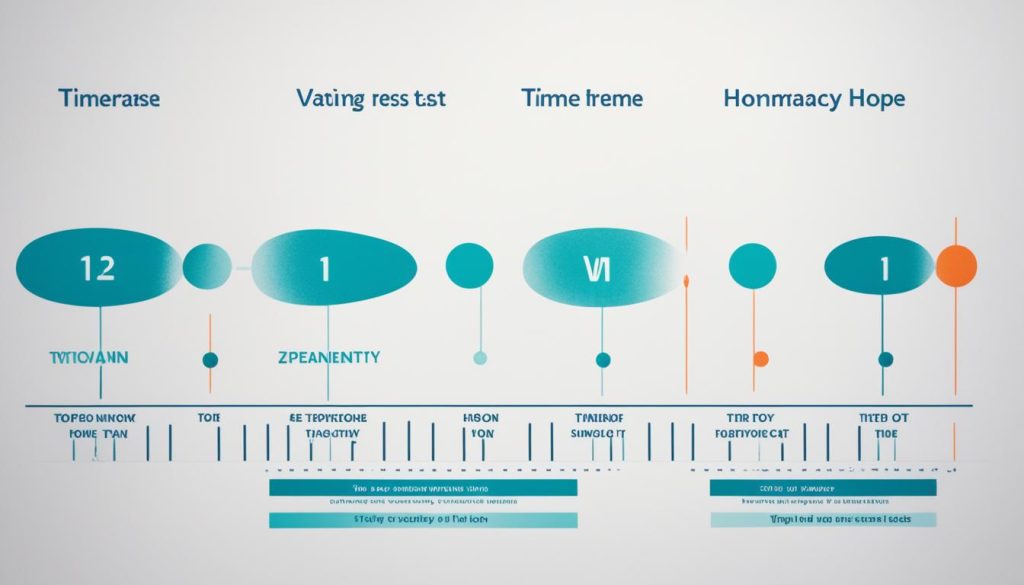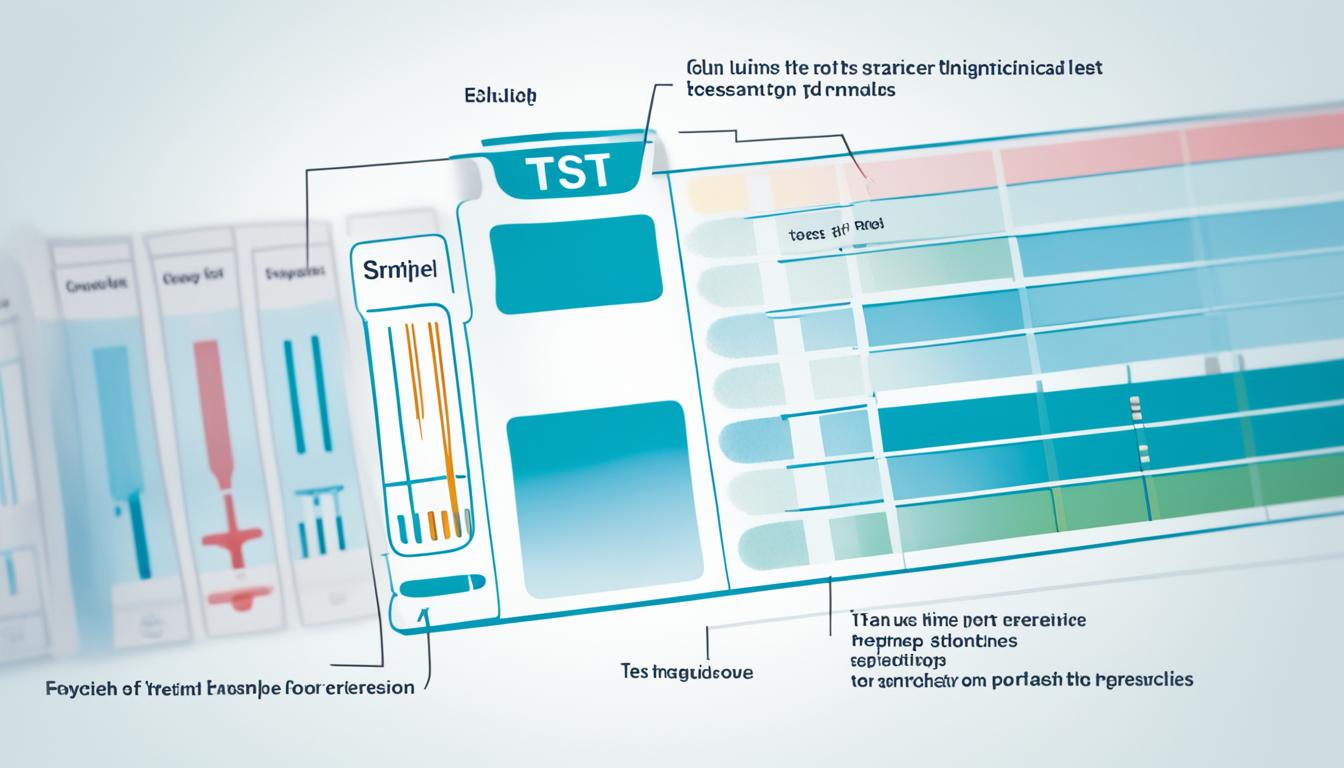When it comes to taking a pregnancy test, timing is everything. You want to make sure that you wait for the right moment to achieve accurate results. By understanding the optimal time to take a pregnancy test, you can increase the likelihood of obtaining reliable information about your pregnancy status.
How Do Pregnancy Tests Work?
Pregnancy tests are a reliable and convenient way to determine if you’re pregnant. These tests work by detecting the presence of a hormone called human chorionic gonadotropin (HCG) in your body. HCG is produced by the placenta shortly after a fertilized egg attaches to the uterine lining.
There are two main types of pregnancy tests: urine tests and blood tests. Urine tests are the most common and are usually done at home.
Urine Tests
Urine pregnancy tests work by using a reactive paper that detects the presence of HCG in your urine. If HCG is present, the test will show a positive result, typically in the form of a plus sign, double vertical lines, or the word “pregnant.” Different brands may have different result indicators, so it’s important to read the instructions carefully.
Urine tests can be done as early as 7-10 days after conception. However, for the most accurate results, it’s recommended to wait until after you’ve missed your period before taking a test.
Blood Tests
Blood tests for pregnancy are less common and are usually done by healthcare professionals. These tests involve taking a blood sample and sending it to a lab for analysis. Blood tests can measure the exact levels of HCG in your blood, making them more sensitive and accurate than urine tests.
Blood tests can detect pregnancy as early as 7-10 days after conception, providing accurate results even before you’ve missed your period.
Overall, both urine tests and blood tests are effective in determining pregnancy. The choice between the two depends on personal preference, convenience, and any specific medical recommendations or requirements.
Below is a table summarizing the key differences between urine tests and blood tests:
| Urine Test | Blood Test |
|---|---|
| Done at home | Done by healthcare professionals |
| 99% accurate when used correctly | Highly sensitive and accurate |
| Results in minutes | Results may take longer (usually within a few days) |
| Can be taken after missed period | Can be taken as early as 7-10 days after conception |
Remember, it’s essential to carefully follow the instructions provided with the pregnancy test kit and consult with a healthcare professional if you have any concerns or questions regarding your test results.
Different Types of Pregnancy Tests
When it comes to determining whether you’re pregnant or not, there are two main types of pregnancy tests: urine tests and blood tests. Each type has its own advantages and is used in different situations.
At-Home Pregnancy Tests
At-home pregnancy tests are the most commonly used and easily accessible option for women who suspect they may be pregnant. These tests use urine samples to detect the presence of the hormone human chorionic gonadotropin (HCG), which is produced during pregnancy.
At-home pregnancy tests are highly effective, with an accuracy rate of about 99% when used correctly. They are available in most drug or grocery stores and can be purchased without a prescription. You can perform the test by either placing drops of urine on a strip or by dipping the strip into a cup of urine.
Here’s a step-by-step guide on how to use an at-home pregnancy test:
- Read the instructions provided with the test carefully.
- Collect a urine sample in a clean container.
- Follow the instructions on how to apply the urine sample to the test strip.
- Wait for the designated amount of time for the test results to appear.
- Check the test results based on the indicators specified in the instructions.
Remember to follow the instructions and wait for the recommended time to get accurate results. Using your first-morning urine, which contains a higher concentration of HCG, can also increase the test’s accuracy.
Blood Tests
Blood tests are another type of pregnancy test, although they are less commonly used and typically reserved for special circumstances. These tests are usually performed at a doctor’s office or a laboratory and require a blood sample to be taken.
There are two types of blood tests that can be done to determine pregnancy: quantitative HCG blood tests and qualitative HCG blood tests.
The quantitative blood test measures the exact amount of HCG in your blood, providing a more precise indication of pregnancy. This test can detect even small levels of HCG and is therefore highly sensitive. It can be done as early as 7-10 days after conception, making it an excellent option for early detection.
The qualitative blood test, on the other hand, simply determines whether HCG is present in your blood or not. This test provides a simple “yes” or “no” answer regarding pregnancy and can be done around the same time as an at-home urine test.
While blood tests are more sensitive and can provide earlier results than at-home pregnancy tests, they are generally only used in specific situations, such as in vitro fertilization (IVF) procedures, when there are potential complications with the pregnancy, or if a woman has irregular periods that make it difficult to determine the timing of her missed period.
The Differences Between At-Home and Blood Tests
| Aspect | At-Home Pregnancy Test | Blood Test |
|---|---|---|
| Method | Urine sample | Blood sample |
| Accuracy | Approximately 99% | Highly sensitive, providing accurate results within 7-10 days after conception |
| Availability | Available in most drug or grocery stores without a prescription | Typically performed at a doctor’s office or a laboratory |
| Timing | After a missed period for higher accuracy | As early as 7-10 days after conception |
| Cost | Relatively inexpensive | More expensive |
No matter which type of pregnancy test you choose, it’s important to follow the instructions carefully and wait for the appropriate timing to ensure accurate results. If you have any concerns or questions, it’s always best to consult with a healthcare professional.

Advantages of Using a Home Pregnancy Test
Using a home pregnancy test offers several benefits that make it a popular choice among individuals who suspect they may be pregnant. These tests provide a convenient, affordable, and reliable method for determining pregnancy. Let’s take a closer look at the advantages of using a home pregnancy test.
1. Inexpensive
Home pregnancy tests are readily available at pharmacies, supermarkets, and online retailers at affordable prices. Compared to medical clinics or laboratories, which often charge higher fees for pregnancy testing, home tests are a cost-effective choice for those on a budget.
2. Easy to Use
Home pregnancy tests are designed to be user-friendly, even for individuals who have no medical background. The simple step-by-step instructions provided with the test kits make it easy and convenient to perform the test in the comfort of your own home. Most tests employ urine samples, which can be easily collected and used for accurate results.
3. Quick Results
With a home pregnancy test, you don’t need to wait for days or weeks to get your results. Most home tests provide results within minutes, allowing you to quickly find out whether you are pregnant or not. This immediate feedback can help alleviate anxiety and provide peace of mind.
4. High Accuracy
When used correctly, home pregnancy tests have a high accuracy rate. Most brands claim an accuracy level of 98-99%, making them a reliable tool in determining pregnancy. Positive results from home tests can be trusted, providing reassurance and guidance for individuals planning their next steps.
While blood tests are considered more sensitive, they are generally more expensive and are typically used in specific situations, such as when there are complications or concerns with the pregnancy. For the majority of individuals, a home pregnancy test offers a convenient and accurate option.
By opting for a home pregnancy test, you can benefit from its affordability, simplicity, speed, and reliability. Now, let’s explore when the best time is to take a pregnancy test in the next section.
How Long Should You Wait to Take a Pregnancy Test?
The optimal time to take a pregnancy test is after you’ve missed your period. Most at-home tests can detect the hormone human chorionic gonadotropin (HCG) in urine about 10 days after conception, but the accuracy is higher when taken after the missed period. It’s crucial to follow the instructions provided with the test for accurate results.
When taking a pregnancy test:
- Use your first morning urine if possible. This is when the concentration of HCG is typically the highest.
- Avoid drinking excessive fluids before testing to prevent diluting the HCG levels in your urine.
If you have irregular cycles or are unsure when you ovulated, it’s recommended to wait at least 21 days after unprotected sex to take a test. This allows for a more accurate result and reduces the chance of a false negative.

Comparison of Pregnancy Test Timing
| Pregnancy Test Timing | Accuracy | Recommended |
|---|---|---|
| Before missed period | Lower accuracy | No |
| After missed period | Higher accuracy | Yes |
| 10 days after conception | Moderate accuracy | No (unless you have regular cycles) |
Waiting until after you’ve missed your period and following the instructions provided with the test will give you the optimal time to check for pregnancy. Remember, if you have any concerns or questions, it’s always best to consult with a healthcare professional.
Conclusion
Taking a pregnancy test at the right time is crucial for accurate results. It is recommended to wait until after you have missed your period to ensure the highest accuracy. Home pregnancy tests are a reliable, inexpensive, and easy-to-use option. They provide quick results and are about 98-99% accurate when used correctly. On the other hand, blood tests are more sensitive and can detect pregnancy earlier, but they are less common and usually reserved for specific situations.
By following the instructions provided with the pregnancy test and waiting for the appropriate timing, you can get the most reliable results. Remember to use your first morning urine if possible, and avoid drinking excessive fluids before testing to ensure the most accurate results. If you have irregular cycles, it is recommended to wait at least 21 days after unprotected sex to take a test.
In summary, home pregnancy tests are a convenient and reliable option for most individuals. They offer the convenience of testing in the privacy of your own home, and they provide accurate results when used correctly. If you suspect you may be pregnant, waiting until after you’ve missed your period and using a home pregnancy test is the best way to obtain accurate results. If you have any concerns or questions, it is always wise to consult with a healthcare professional.




